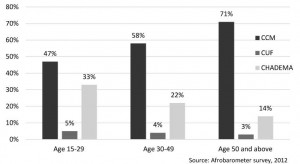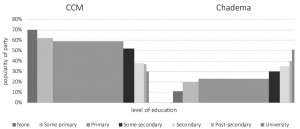by Ben Taylor
As the Tanzanian political scene gears up for the 2015 presidential and parliamentary elections, CCM remain in a strong position, despite a growing challenge from Chadema.
But who exactly supports Chadema, and who backs CCM? It has often been assumed that Chadema draws most of its support from a young, urban demographic, while CCM retains strong support in rural areas, though there has been little information available to back this up.
Recently released data from the Afrobarometer initiative, a continent-wide public opinion survey, allows us to examine this question in more detail. The survey asked the standard opinion poll question: If an election were held tomorrow, which party’s candidate would you vote for?
First, the survey found that support for Chadema was indeed substantially stronger among 15-29 year olds (at 33%) than the over 50s (14%). Conversely, support for CCM rises with age, from just under half the 15-29 year olds (47%), and nearly three in four of those over 50 (71%). Support for CUF and other parties was negligible.
(This survey was conducted in 2012, so those who were 15 at the time will be of voting age by the time of the 2015 election.)
There is also a strong link between a voter’s level of education and their party affiliation. At each successive level of education, support for CCM dropped, and support for Chadema rose. Among those with post-secondary or university-level education, support for Chadema was higher than for CCM – 51% v 30% among university graduates. Support for CCM among less well-educated groups remains well ahead of Chadema. Among those with primary education, CCM has the support of a strong majority: 59% to Chadema’s 23%.
Since those with primary education or below represent three quarters of all potential voters (8% have no formal education, 13% have some primary education and 58% have completed primary education), this suggests Chadema have a lot of work to do to bring less-well-educated voters to their side.
Opinion poll data – a staple of political journalism across much of the world – have only very occasionally been available in Tanzania. The fast turn-around times of UK-style polls is simply not possible in Tanzania, where there is no easy way of quickly producing a random sample and few organisations have both the capacity and the credibility to carry out polls.
However, two separate initiatives have begun to fill this gap. Twaweza [‘we can make it happen’] have set up a nationally representative survey panel, reachable by mobile phone, and are now conducting twice-monthly public opinion surveys. This initiative is known as Sauti za Wananchi – Voices of the People.
And the Afrobarometer initiative, a periodic Africa-wide survey of public opinion, has recently published data from its 2012 survey round, including Tanzania. This article draws exclusively on Afrobarometer
data.


